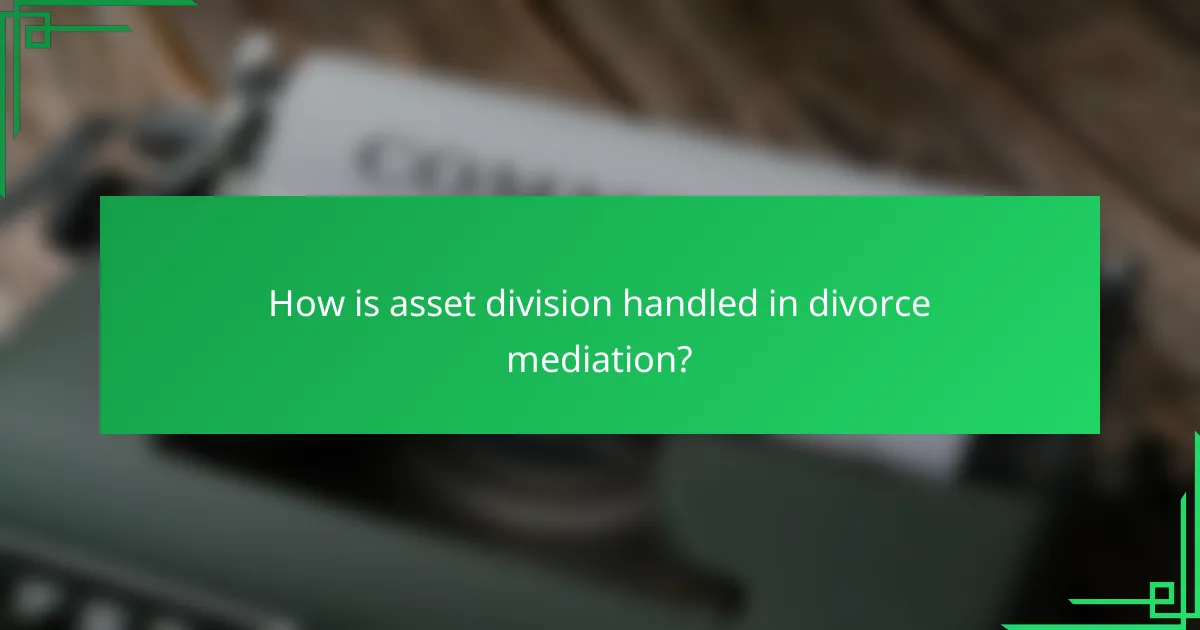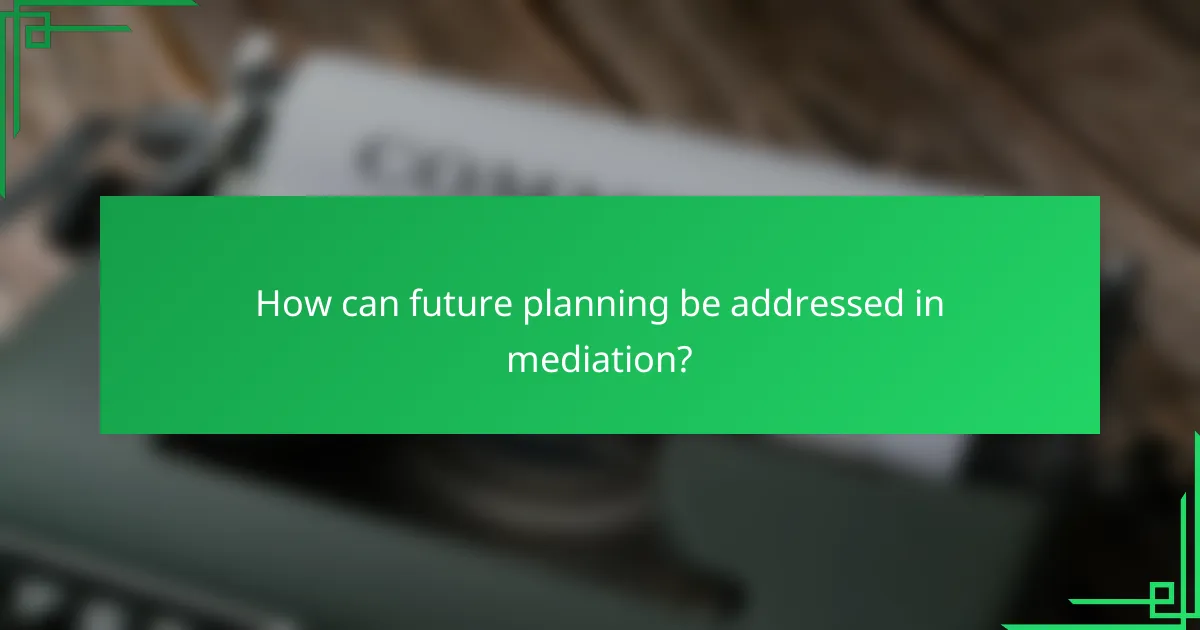Divorce mediation is a constructive process where couples collaborate with a neutral mediator to address key issues such as asset division, emotional healing, and future planning. By fostering open communication, this approach helps couples reach mutually beneficial agreements while minimizing conflict and court involvement.

How does divorce mediation work in Australia?
Divorce mediation in Australia is a structured process where couples work with a neutral third party to resolve disputes related to asset division, emotional healing, and future planning. This approach aims to facilitate communication and reach mutually agreeable solutions without going to court.
Process overview
The mediation process typically begins with an initial meeting where both parties and the mediator discuss the issues at hand. This is followed by joint sessions where each party can express their views and concerns. The mediator guides the conversation, helping to clarify points and explore potential solutions.
Sessions may vary in length, often lasting from one to three hours, and can take place over several weeks or months, depending on the complexity of the issues. It’s essential for both parties to come prepared with relevant financial documents and a clear understanding of their priorities.
Role of the mediator
The mediator’s primary role is to facilitate communication between the parties and help them identify their needs and interests. They do not make decisions for the couple but rather assist in exploring options and finding common ground. A skilled mediator can help reduce conflict and keep discussions focused on productive outcomes.
Additionally, mediators are trained to manage emotions that may arise during discussions. They create a safe environment where both parties can express their feelings, which is crucial for emotional healing during the divorce process.
Legal framework
In Australia, divorce mediation is guided by the Family Law Act 1975, which encourages parties to resolve disputes amicably. While mediation is not legally binding, any agreements reached can be formalized through a consent order in court, making them enforceable.
It is advisable for individuals to seek independent legal advice before finalizing any agreements to ensure their rights are protected. Understanding the legal implications of asset division and parenting arrangements is crucial for effective mediation outcomes.

What are the benefits of divorce mediation?
Divorce mediation offers several advantages, including reduced costs, emotional support, and quicker resolutions compared to traditional litigation. This collaborative process allows both parties to negotiate asset division and future planning in a less adversarial environment.
Cost-effectiveness
Divorce mediation is often significantly cheaper than going through the court system. Mediation fees typically range from a few hundred to a couple of thousand dollars, while litigation can escalate into tens of thousands, depending on the complexity of the case.
By minimizing legal fees and court costs, couples can allocate their resources more effectively, preserving funds for future needs such as child support or shared living expenses. It’s advisable to compare the costs of mediation versus litigation to make an informed decision.
Emotional support
Mediation provides a supportive environment where both parties can express their feelings and concerns. This emotional aspect can help reduce stress and anxiety, making the process more manageable.
Additionally, mediators often have training in conflict resolution and emotional intelligence, which can facilitate healthier communication. This support can be crucial for individuals navigating the emotional challenges of divorce, promoting healing and understanding.
Faster resolution
Divorce mediation typically leads to quicker resolutions than court proceedings, which can drag on for months or even years. Mediation sessions can often be scheduled at the convenience of both parties, allowing for a more flexible timeline.
By focusing on collaboration rather than confrontation, mediation can help couples reach agreements on asset division and future planning in a matter of weeks. This efficiency not only saves time but also reduces the emotional toll associated with prolonged disputes.

How is asset division handled in divorce mediation?
Asset division in divorce mediation involves negotiating the fair distribution of marital property and debts between spouses. This process aims to reach an agreement that reflects both parties’ contributions and needs, often resulting in a more amicable resolution compared to litigation.
Types of assets considered
In divorce mediation, various types of assets are evaluated, including real estate, bank accounts, retirement funds, investments, and personal property. Marital assets are typically those acquired during the marriage, while separate assets are those owned before the marriage or received as gifts or inheritances.
It is essential to identify and categorize these assets accurately, as this will influence the negotiation process. For instance, the family home may hold significant emotional value, while retirement accounts can represent substantial financial resources.
Equitable distribution principles
Equitable distribution principles guide how assets are divided in divorce mediation, focusing on fairness rather than an equal split. Factors considered include the length of the marriage, each spouse’s financial situation, contributions to the marriage, and the needs of any children involved.
In many jurisdictions, equitable distribution does not mean a 50-50 split; instead, it may result in one spouse receiving a larger share based on specific circumstances. Understanding these principles helps parties set realistic expectations during negotiations.
Common negotiation strategies
Effective negotiation strategies in divorce mediation include open communication, prioritizing interests over positions, and exploring creative solutions. Both parties should be prepared to discuss their needs and concerns openly, which can foster a collaborative atmosphere.
Additionally, using a neutral mediator can help facilitate discussions and keep negotiations focused. It is crucial to remain flexible and willing to compromise, as this can lead to more satisfactory outcomes for both parties.

What emotional healing can be achieved through mediation?
Mediation can facilitate significant emotional healing by providing a structured environment for open dialogue and mutual understanding. This process helps individuals express their feelings and concerns, leading to a sense of closure and the ability to move forward positively.
Communication improvement
Mediation enhances communication skills by encouraging participants to articulate their thoughts and feelings clearly. This practice fosters active listening, allowing each party to understand the other’s perspective without interruption or judgment.
For example, using “I” statements can help individuals express their emotions without placing blame, which can lead to healthier interactions. Practicing these skills during mediation can translate into better communication in future relationships.
Conflict resolution skills
Through mediation, individuals learn effective conflict resolution techniques that can be applied beyond the mediation setting. Participants are guided to identify underlying issues and work collaboratively towards mutually beneficial solutions.
Common strategies include brainstorming options, evaluating the pros and cons of each, and finding common ground. These skills can significantly reduce the likelihood of future disputes and enhance overall relational dynamics.
Support resources available
Mediation often connects individuals with various support resources that can aid in emotional healing. These resources may include counseling services, support groups, or educational workshops focused on coping strategies and personal development.
Utilizing these resources can provide additional emotional support and guidance, helping individuals navigate their feelings and experiences during and after the mediation process. Accessing local community services can further enhance this support network.

How can future planning be addressed in mediation?
Future planning in mediation focuses on creating a structured approach for life after divorce, addressing key areas such as child custody, financial stability, and ongoing relationship management. This process helps both parties to set clear expectations and develop actionable plans for their new circumstances.
Child custody arrangements
Child custody arrangements are crucial in mediation, as they determine where children will live and how decisions will be made regarding their upbringing. Parents should consider various custody options, including joint custody, where both parents share responsibilities, or sole custody, where one parent has primary authority.
When discussing custody, it’s essential to prioritize the children’s best interests. Factors such as each parent’s living situation, work schedules, and the children’s needs should be evaluated. Drafting a detailed parenting plan can help clarify visitation schedules and decision-making processes.
Financial planning post-divorce
Financial planning post-divorce involves assessing assets, debts, and income to ensure both parties can maintain financial stability. Mediation can facilitate discussions about equitable asset division, including property, savings, and retirement accounts.
It’s advisable to create a budget that reflects new living expenses and financial responsibilities. Consider consulting a financial advisor to explore options like spousal support or child support, which can provide additional financial security during the transition.
Long-term relationship management
Long-term relationship management focuses on maintaining a cooperative relationship between ex-spouses, especially when children are involved. Effective communication is key; consider establishing regular check-ins to discuss any issues that arise regarding the children or shared responsibilities.
Setting boundaries and respecting each other’s space can help reduce conflicts. Utilizing tools like co-parenting apps can streamline communication and scheduling, ensuring that both parties stay informed and engaged in their children’s lives.

What criteria should be used to choose a divorce mediator?
Choosing a divorce mediator involves evaluating their experience, approach, and compatibility with both parties. Key criteria include qualifications, mediation style, and their ability to facilitate communication effectively.
Experience and qualifications
When selecting a divorce mediator, consider their professional background and training in mediation. Look for mediators with certifications from recognized organizations, such as the Association for Conflict Resolution or state-specific mediation boards. Experience in family law is also crucial, as it ensures the mediator understands the complexities of asset division and emotional dynamics.
Mediation style
Mediation styles can vary significantly, so it’s essential to find one that aligns with your needs. Some mediators adopt a facilitative approach, guiding discussions without imposing solutions, while others may take a more evaluative stance, offering opinions on potential outcomes. Discussing these styles during initial consultations can help determine which is most suitable for your situation.
Compatibility and communication
Effective communication is vital in mediation, so assess how well the mediator connects with both parties. A good mediator should foster an environment where both individuals feel heard and respected. Consider scheduling a preliminary meeting to gauge comfort levels and ensure that the mediator can facilitate discussions without bias.
Cost and availability
Understanding the mediator’s fees and availability is essential for practical planning. Mediation costs can range from a few hundred to several thousand dollars, depending on the mediator’s experience and the complexity of the case. Ensure that the mediator’s schedule aligns with yours to avoid unnecessary delays in the process.
